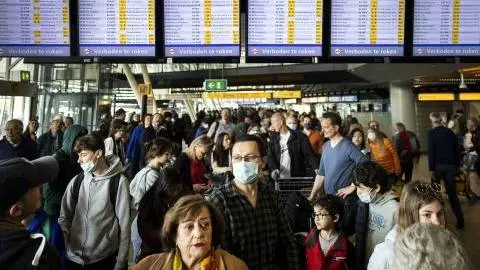July ING Monthly: Europe’s recovery is cancelled
Recession is in the air, we’re revising down our growth forecasts, and the European Central Bank finds itself in an ever-deepening predicament. The chaos at our airports is perhaps acting as an analogy for what’s to come as cancellations mount, frustrations deepen and disappointments grow
Executive summary
We hear the term 'cancel culture' all the time these days. The Merriam-Webster dictionary defines it as 'the practice or tendency of engaging in a mass cancelling as a way of expressing disapproval and exerting social pressure'. Right now, the phrase is assuming its more traditional meaning.
Look at Europe. Flights and trains are being cancelled because there aren't enough skilled workers; the industry was ill-prepared for the post-Covid summer season. High inflation is leading to ‘cancellations’ of consumption and increasingly also to ‘cancellations’ of new investments and industrial orders. As a result, the long-awaited economic recovery of the eurozone has been cancelled. The rebound of economic activity after the end of lockdowns in the hospitality, leisure and services sectors has been offset by the war in Ukraine, new supply chain frictions and high inflation. While many Europeans try to enjoy summer, a very hot economic autumn and winter period is already on the horizon. None of the current risk factors for the eurozone economy is likely to disappear soon, not least the war in Ukraine. And that will continue to pile additional pressure on energy and commodity prices, and economic sentiment.
Further afield, unless China significantly changes its zero-Covid strategy, the May lockdowns in Shanghai won't be the last to test global supply chains. And could new Covid strains bring in new restrictions as we head into the darker months? It's possible. And because of all that, we've revised downwards our growth forecasts for the eurozone and we see a recession at the turn of the year. And this is without actually predicting a full stop of Russian oil and gas.
With a looming recession but stubbornly high inflation, the European Central Bank is facing multiple dilemmas, not least the size of its first interest rate rise on 21 July. Up to now, most ECB officials have echoed the line taken at the last meeting, that the Bank ‘intends’ to hike rates by 25bp. It appears to be taking inspiration from the US Fed which also hiked by ‘only’ 25bp at the start of the recent rate lift-off. However, the euro is close to parity and there's a high risk that the ECB’s own macro projections in September will show at least a stagnating economy in 2023. And that could motivate policymakers to front-load those intended hikes.
The second massive challenge is how to combine fighting inflation and hiking interest rates without destabilising bond yield spreads and risking a new euro crisis. The ECB’s new anti-fragmentation tool can only work if it illustrates the ECB’s willingness to be the lender of last resort in the eurozone. If financial markets start to doubt such a commitment, details on size and conditionality hardly matter anymore.
The economics of the eurozone argue against a return of the euro crisis. Public finances were more sustainable at the start of the pandemic. Governments used the long period of low and negative interest rates to roll over debt and substantially reduce interest burdens. The eurozone was hit by an external and not a country-specific shock; the European Recovery Fund provides pan-European fiscal support and the institutional set-up to deal with sovereign debt crises has also improved since 2010. Also, never underestimate the political capital which has been invested in monetary union plus the fact that with the current geopolitical uncertainty and the war in Ukraine, it is hard to see European governments consciously torpedoing the union.
However, history tells all of us to always be very cautious when economists claim that this time is 'different'. Without a fiscal and political union, the eurozone will always be vulnerable but eventually, it will always be politics not economics deciding on the monetary union’s destiny. At least the biggest project of European integration will not be cancelled this summer.
Download
Download report
7 July 2022
ING Monthly: Europe’s recovery is cancelled This bundle contains 14 ArticlesThis publication has been prepared by ING solely for information purposes irrespective of a particular user's means, financial situation or investment objectives. The information does not constitute investment recommendation, and nor is it investment, legal or tax advice or an offer or solicitation to purchase or sell any financial instrument. Read more
